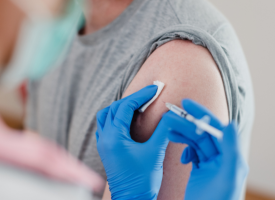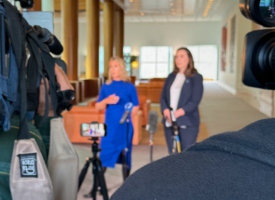Transcript - Dr Gannon - 3AW - Cancer Screening
Transcript: AMA President, Dr Michael Gannon, 3AW, Mornings with Tony Jones,
19 January 2018
Subject: New blood test to detect cancer
TONY JONES: Now, I just want to move on a little bit, because you would have heard- this has got to be the best news story of the year so far, surely. Australian scientists at the Walter and Eliza Hall Institute are among a team of researchers who have developed a cancer test. Now, it's called Cancer Screen [sic]. What it basically is, is a blood test that detects cancers long before there's any symptoms. The downside is it's a little while yet from hitting the market, but by the looks of things, it really is incredible and could certainly save lives in years to come. Joining us on the line is Dr Michael Gannon. Michael's the President at the Australian Medical Association.
G'day Michael.
MICHAEL GANNON: Good morning Tony, how are you?
TONY JONES: Look, mate, I'm really good, but buoyed even more so by this news today.
MICHAEL GANNON: Yeah, this is potentially very exciting. This is the holy grail, in many ways: the simple, non-invasive test that picks up many cancers at the early stage. We've got tests a bit like this for a small number of cancers, but when you see that this test potentially can pick up something like pancreatic cancer, which classically presents at an advanced stage, sometimes with only- a patient's only got months to live, this is potentially very exciting.
TONY JONES: So when you say non-invasive, what form would the tests take?
MICHAEL GANNON: Well, I've only learnt about the test today, Tony, but it's basically a blood test, and there's not many examples where a blood test offers this type of screening. The comparison in the article is made with the PSA test for prostate cancer, which we know is full of false positives and false negatives. GPs, urologists, other specialists do use the PSA from time to time, but it doesn't quite meet the standard we require of a screening test.
I mean, in Australia we're very lucky. We've got two absolutely world-leading screening programs that detect cancers at an early stage; one of them is the latest incarnation of the pap smear, for detection of cancer of the cervix; and the other one is the National Bowel Cancer Screening Program. Now, the only reason the Government goes to the massive, multimillion dollar expense with those tests is that they're worth it at population level. It's exciting to think that this blood test might join that suite of tests.
TONY JONES: Gee, I tell you what, you'll probably tell me off here, but I got yet another reminder from the Government only yesterday about that bowel cancer test, and at some point I will get around to it. You spoke there about the false positives, and this eliminates that, and I know that there's so many people that go through this unnecessary angst of having delivered bad news, and I think even Neil Mitchell went through that some years ago, you might recall. So this eliminates that unnecessary angst too, does it?
MICHAEL GANNON: Look, I think there's a long way to go with this test, and look, not to confuse the issues here deliberately, Tony, but we're hearing a lot of talk recently about medicinal cannabis and its use. Before governments – on the advice of their bureaucracy and their scientific experts, and hopefully they talk to the doctors at the frontline – before they invest tens of millions, sometimes hundreds of millions, sometimes billions of dollars in medications, tests, whatever form they take, they do subject them to substantial scientific scrutiny.
So we've got a long way to go with this test, and it will be subjected to that scrutiny with second and third phase trials, perhaps overseas, perhaps here in Australia, but it does move us closer to the holy grail, to detect some of these cancers. What we've got to do is when we do have a test, make sure that it reaches every corner of the population. You are in trouble, Tony, for not having done your bowel cancer test …
TONY JONES: Yeah, I know.
MICHAEL GANNON: … you should do it. It's simple, it's easy. The instructions are on the packet. It's so important that women attend to their pap smears, because they're two examples of tests that have been well-validated, they're really cheap. You can pick up things at an early stage, and do something about it. The hope that we could have something different for a pile of other forms of cancer – I agree with you, it's very exciting.
TONY JONES: It is, and I suppose we're an impatient society, aren't we, in that we want things done straight away, and so often we hear on the radio, read in the newspaper, and see on the television news services about breakthroughs in the fight against this and the fight against that, but we don't seem to- you know what I mean? Like, you don't hear about it after that, in terms of, okay, it's now set in place, this is what we can do, and, yes, a cure is on the way-type thing. So is there a timeframe with this, or is it- well, I guess it's like any doctor's going to answer how long is a piece of string.
MICHAEL GANNON: Look, they do make good copy for the media, let's face it, and people are increasingly interested in health. So whether you're talking about television current affairs programs, radio, new media, it's always good content. And it's good that people are thinking about their health. Everyone heading off to the tennis today: do the smart thing and cover up, pile on the sun cream every two hours. I would love to see the same emphasis on cancer prevention that we have on cancer screening or cancer treatment. They're all important, but this is potentially a very, very exciting development, but yeah, if I could again reinforce that lesson. We, in this country, every year, spend billions of dollars on treatment of cancer. Sadly, there is still billions of dollars of money lost in premature death due to cancer. We need to spend the time talking about prevention of these various different cancers.
TONY JONES: Alright. Well, as you said, it's exciting news, we've just got to learn to be patient, so to speak, if I can use that pun. Good to talk to you, Michael.
MICHAEL GANNON: Yes, good morning, Tony. Look after yourself.
TONY JONES: Okay. Thank you very much. Dr Michael Gannon joining us there, the president of the Australian Medical Association. It is a fascinating breakthrough, it really is, and as I said, we are impatient when it comes to wanting these things set in stone, and the fact that you could go along to your doctor and give a blood test and they can detect possible cancers so early in the piece, before the symptoms set in, would be just absolutely remarkable. Absolutely remarkable. You'd love a crystal ball to look into it to see what the medical breakthroughs will be like in 50 years or so.
19 January 2018
CONTACT: John Flannery 02 6270 5477 / 0419 494 761
Maria Hawthorne 02 6270 5478 / 0427 209 753
Follow the AMA Media on Twitter: http://twitter.com/ama_media
Follow the AMA President on Twitter: http://twitter.com/amapresident
Follow Australian Medicine on Twitter: https://twitter.com/amaausmed
Like the AMA on Facebook https://www.facebook.com/AustralianMedicalAssociation



